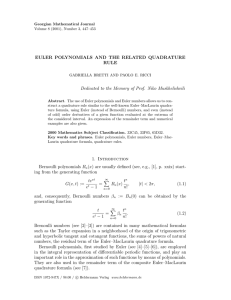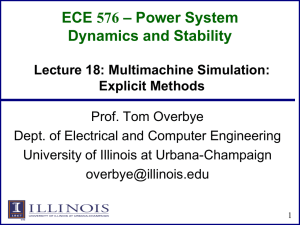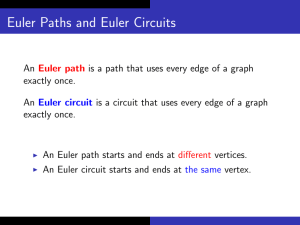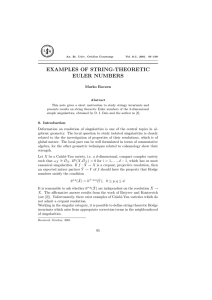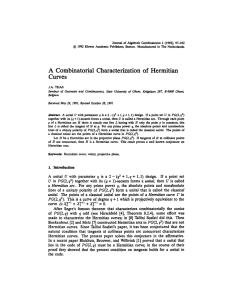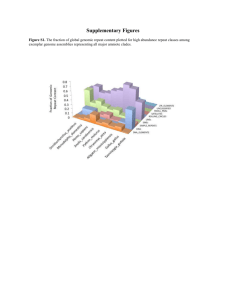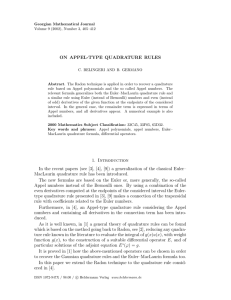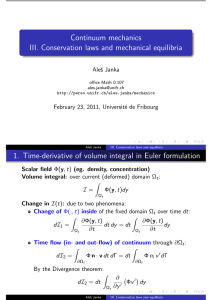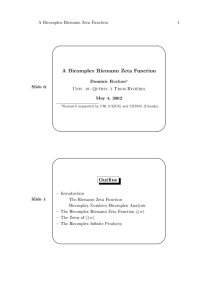Special Functions & Physics G. Dattoli ENEA FRASCATI
advertisement
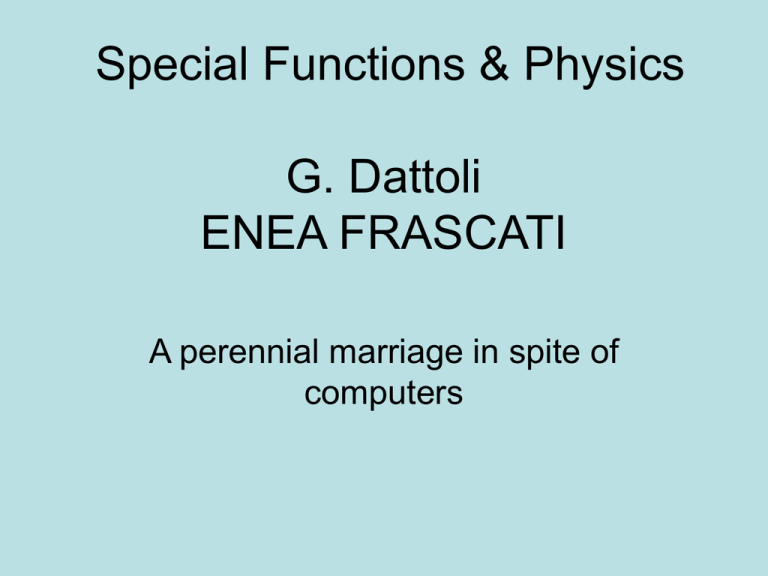
Special Functions & Physics G. Dattoli ENEA FRASCATI A perennial marriage in spite of computers Euler Gamma Function Defined to generalize the factorial operation to non integers 0 0 n! t n e t dt ( x ) t x 1e t dt, Re( x ) 0 ( x 1) x ( x ) (n 1) n! Inclusion of negative arguments ( x ) limn n! n x n ( j x) x m ( x ) j 0 (1 x ) 1 sin( x ) ( x ) Euler Beta Function Generalization of binomial I ( x, y ) e ( x 1) (1 e ) y 1 d , 0 1 e t t x 1 (1 t ) y 1 dt B( x, y ) 0 ( x) ( y ) 1 x y 1 B ( x, y ) ( x y ) x y 1 1 Further properties BETA: if x, y are both non positive integers the presence of a double pole is avoided ( 1)n 1 ( y ) B ( x, y ) n! ( x n ) ( y n ) n 0 ( 1)m 1 ( x ) m 0 m! ( y m ) ( x m ) EULER 10 SWISS FRANCKS Strings: the old (beautiful) times and Euler & Veneziano • Half a century ago the Regge trajectory • Angular momentum of barions and mesons vs. squared mass Old beautiful times… • The surprise is that all those trajectories where lying on a stright line J ( s) 0 s, J m ( s) 0 m s • Where s is the c. m. energy and the angular coefficient has an almost universal value 1GeV 2 Mesons and Barions Strings: Even though not immediately evident this phenomenological observation represented the germ of string theories. The Potential binding quarks in the resonances was indeed shown to increase linearly with the distance. Meson-Meson Scattering • m-m s ( p(1) p( 2) ) 2 , t ( p(1) p( 4) ) 2 , 4 u ( p p ) s t u mi2 (1) ( 3) 2 i 1 Veneziano just asked what is the simplest form of the amplitude yielding the resonance where they appear on the C.F. Plot, and the “natural” answer was the Euler B-Function ( ( s)) ( (t )) A( s, t ) B( ( s), (t )) ( ( s) (t )) From the Dark… • An obscure math. Formula, from an obscure mathematicians of XVIII century… (quoted from a review paper by a well known theorist who, among the other things, was also convinced that the Lie algebra had been invented by a contemporary Chinese physicist!!!) • From an obscure math. formula to strings • “A theory of XXI century fallen by chance in XX century” • D. Amati Euler-Riemann function… 1 ( x) x n 1 n It apparently diverges for negative x but Euler was convinced that one can assign a number to any series An example of the art of manipulating series S 1 2 3 4 5 6 ... O E 1 T (t ) ( 1)n t n tT (t ) ( 1)n n t n 1 1 t s 0 n 1 1 1 T (1) S 1 2 3 4 ... 2 (1 t ) 4 Divergence has been invented by devil, no…no… It is a gift by God S 1 2 3 4 ... O 1 3 5 ... D 2 4 6 ... 1 ( 1) 1 n 1 n O E n n 1 S OE 2E S E 2 S 3 1 1 1 12 n 1 n 1 2 3 ... ( 1) 1 12 1 4 Integral representation for the Riemann Function 1 x A x 1 A e d ( x ) 0 a n 0 n 1 1 a 1 1 n x 1 ( x) x e d n 1 n n 1 ( x ) 0 1 1 x 1 d ( x) 0 e 1 Planck law 8 h 3 u( , T ) c3 1 h KT , 1 3 U x 0 u(, T ) d L3 0 e x 1 (4) (4) e Analytic continuation of the Riemann function • Ac (1 s ) 21 s s cos( s )( s ) ( s ) 2 (1) 2 2 2 Analytic continuation & some digression on series • From the formula connecting half planes of the Riemann function we get s (1 s) 2 ( s) cos ( s), s 2 2 1 1 1 ( 1) 2 (2) (2) 2 2 2 2 n 1 n 1 s • 1 1 ? 2 2 n1 n s ..digression and answer • “Euler” proved the following theorem, concerning the sum of the inverse of the roots of the algebraic equation bn xn bn1xn1 ... b1 x b0 0 n 1 b1 b0 s 1 xs …answer • Consider the equation x3 x5 x7 y2 y4 sin(x ) 0 x ... 0 1 ... 0 3! 5! 7! 3! 5! 2 ys2 s y ( s ) 2 s 2 s 1 2 1 1 2 2 s 6 1 (2) (1) 6 12 Casimir Force • Casimir effect a force of quantum nature, induced by the vacuum fluctuations, between two parallel dielectric plates Virtual particles pop out of the vacuum and wander around for an undefined time and then pop back – thus giving the vacuum an average zero point energy, but without disturbing the real world too much. Casimir: The Force of empty space Sensitive sphere. This 200-µm-diameter sphere mounted on a cantilever was brought to within 100 nm of a flat surface to detect the elusive Casimir force. Casimir Calculation a few math • Elementary Q. M. yields diverging sum 1 E En , 2 n (n ) n c k k a2 2 x 2 y 2 1 E 2 dkx dk y A n 2 n 1 Regularization & Normalization • We can explicitly evaluate the integral 1 E 2 dkx dky A n n 2 n 1 c1 s 2 s 1 3 s n 2 a 3 s 3 s n E (s) A E c ( 3 ) F c a A 6 a3 A E s 2 ( 3) n 3 n 1 • What is it and why does it provide a finite result? Are we now able to compute the Casimir Force? • Remind that E c 2 (3) Fc a 3 A 6a A E • And that ( 3) n 3 n 1 • And that s (1 s) 2 ( s ) cos ( s ), s 2 2 1 3! 1 ( 3) ( 4 ) ( 4 ) 4 4 4 8 8 n 1 n 1 s s A further identity T3 (t ) (1) n t t t T (t ) n 3 n s 0 1 T (t ) (1) t 1 t n 1 T3 (1) S3 O3 E3 n n 3 Again dirty tricks • Going back to Euler O3 13 33 53... E3 23 43 63... 23 (O3 E3 ) 3 O3 E3 (3) S 3 13 23 33 43 53 63 ... O3 E3 Ec S3 c 2 1 (3) 3 4 760a A 120 1 2 e2 Sc a , Sc 760 2 e2 a , c 2 What is the meaning of all this crazy stuff? • The sum o series according to Ramanujian 1 n (1) , 12 n 1 Renormalization: Quos perdere vult Deus dementat prius • A simple example, the divergence from elementary calculus 1 n 1 I ( x, n ) x dx x c n 1 n I ( x,1) ln(x) c The way out: A dirty trick or mathemagics • We subtract to the constants of integration • A term (independent of x) but with the same behaviour (divergence) when n=-1. • That’s the essence of renormalization subtract infinity to infinity. • We set 1 cc n 1 Dirty...Renormalization finiteterm • Our tools will be: subtraction and evaluation of a limit n 1 x 1 I ( x,1) limn1 ( )c n 1 ax 1 lim x0 ln(a ) I ( x,1) ln(x ) c x Is everything clear? • If so • prove that ! 2 find a finite value for n n ( 1 ) n! x n 0 • The diverging series “par excellence” Shift operators (Mac Laurin Series expansion) f ( x b) e s bx b (s) f ( x) s 0 s! bs s f ( x) x f ( x) s 0 s! Series Summation 1 x , 1 x n 0 n 1 (n) n ˆ ˆ f (O) f (0) O , n 0 n! 1 nx e x 1 e n 0 We can do thinks more rigorously n 0 n 0 f ( x n) en x f ( x ) 1 f ( x) x 1 e x nx 1 x f ( x ) x Bn f ( x) e 1 n! n 0 1 x Bn Bernoullinumbers t t tk 1 Bk t e 1 2 k 2 k! Jacob Bernoulli and E.R.F. Ars coniectandi 1713 (posthumous) m1 1 m! f ( x) x (m) Bn n! (m 1 n)! n 0 m Diverging integrals in QED • In Perturbative QED the problem is that of giving a meaning to diverging integrals of the type I m k dk, k m 0 2 , m positive, sm all UV divergences, m negative, l arg e IR divergences Schwinger Was the first to realize a possible link between QFT diverging integrals and Ramanujan sums I m, 0 B2 r m m p dp n am , r m 2 r 1 , 2 n 1 r 1 ( 2 r )! m ( m 1) am , r , ( m 2 r 2) m I m, I ( m 1, ) ( m) 2 B2 r am , r ( m 2r 1) I ( m 2 r , ) r 1 ( 2 r )! Recursions 1 I (0, ) (0) , 2 1 I (1, ) I (0, ) (1), 2 1 I (3, ) ( I (0, ) a2,1 B2 ) (1), 2 ... Self Energy diagrams • Feynman loops (DIAGRAMMAR!!! ‘t-HooftVeltman, Feynman the modern Euler) • Loops diagram are divergent • Infrared or ultraviolet divergence k0 k F.D. and renormalization • a I m, B2 r m I (m 1, ) (m) 2 am, r (m 2r 1) I (m 2 r , ) r 1 ( 2 r )! The Euler Dilatation operator x x xn n xn ( x x) p xn n p xn , e xx x n s 0 n s x n e n x n (e x )n s! e x x f ( x ) f e x Can the Euler-Riemann function be defined in an operational way? • We introduce a naive generalization of the E-R function n x x x x n p n xn ( x, p ) p n 1 n p x ( x, n ) ( x x ) 1 x p n 1 a 1 a 1 e d ( ) 0 1 Dˆ 1 ˆ Zp e d , ( p ) 0 Dˆ x x x 1 1 1 x ( x, n ) ( x x ) p x n ( x x ) p Can the E-R Function…? YES Dˆ x • The exponential operator e operator Dˆ x e , is a dilatation f ( x) f (e x) x 1 x ˆ D p 1 ( x, p) Zˆ p e d 1 x ( p ) 0 1 x x e p 1 d ( p ) 0 1 x e x p 1 d ( p ) 0 e x More deeply into the nature of dilatation operators • So far we have shown that we can generate the E-R function by the use of a fairly simple operational identity 1 x ˆ D p 1 ( x, p ) e d ( p ) 0 1 x x p 1 d ( p ) 0 e x (1, p) ( p) Operators and integral transforms • Let us now define the operator (G. D. & M. Migliorati Zˆ p 1 Dˆ p 1 e d ( p) 0 • And its associated transform, something in between Laplace and Mellin Zˆ p f ( x ) 1 p 1 f ( e x ) d ( p ) 0 Zˆ p ( x, m) ( x, m p) Zeta and prime numbers Euler!!! (s) p 1 1 1 s p A lot of rumours!!! Hermitian and non Hermitian operators • The operator x x is not Hermitian • The Hamiltonian 1 1 ˆ H ( x p p x ) i ( x x ) 2 2 • Is Hermitian (at least for physicist) Evolution operator Uˆ ( ) e 1 x x 2 e 1 Dˆ x 2 e Riemann hypothesis • RH: The non trivial zeros are on the critical line: 1 it 2 The Riemann hypothesis:The Holy Graal of modern Math • What is the point of view of physicists? • The Berry-Keating conjecture: …zeros Coincide with the spectrum of the Operator: 1 Hˆ i ( x x ) 2 namely 1 2 ( i En ) 0 Lavoro di Umar Mohideen e suoi collaboratori all’università di California a Riverside Una sfera di polistirene 200 µm di diametro ricoperta di oro (85,6 nm) attaccata alla leva di un microscopio a forza atomica, ad una distanza di 0.1 µm da un disco piatto coperto con gli stessi materiali. L’attrazione tra sfera e disco ricavata dalla deviazione di un fascio laser. Differenza tra dato seprimentale e valore teorico entro 1%. Sensibilità: 10-17 N Vuoto: 10-1-10-6 Pa EULER-BERNOULLI 2 2 k 1 2 k (2 k ) B2 k , (2 k )! 1 2z z 2 k 1 ctg ( z ) 2 2 2 k 2 k , 2 z n 1 z (n ) k 1 1 ctg ( z ) z k 1 (1) k 2 2 k B2 k (2 k )! z 2 k 1 Beta the way out • …The Beta function once more n D a 2 B ( x, y ) ( L) D ( ) 2 • More details upon request
